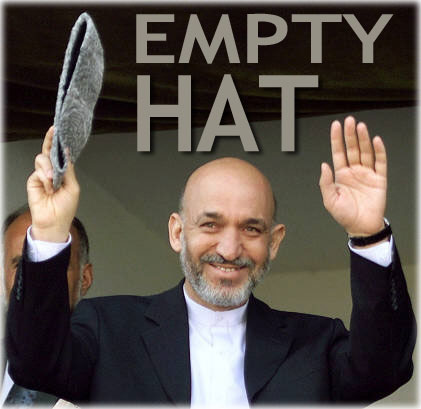
Foreign Investors
Take A Pass On
Karzai's Afghanistan
by Marc W. Herold
Departments of Economics and Women's Studies
Whittemore School of Business & Economics
University of New Hampshire
POSTED AUGUST 14, 2003 --
Since the "end" of the war in Afghanistan, no major foreign equity investment in either the goods or the resources-producing sectors has been made, notwithstanding President Karzai's frantic travels abroad seeking to woo investors.
This contrasts sharply with Afghanistan under the Taliban [1996-2001], when both the giant U.S. oil firm UNOCAL, committed to building a trans-country gas pipeline and a private New Jersey-based enterprise, Telephone Systems International Inc., secured a license from the Taliban to set up an integrated, high-tech communications network costing $240 million1.
The Taliban for all their faults, were able to put in place a degree of political stability and means to enforce contracts - after all, in one year they reduced poppy cultivation to next to nothing.
To date, direct foreign investment in Afghanistan has involved two cell phone companies, two air express services, three hotels, three [minor] airlines establishing links with Kabul, a Chinese importing agency, and private individuals in some restaurants [e.g. B's Place, set up by an Australian2, and a new Thai restaurant], bars [e.g. the British-owned Irish Club, which ironically was recently forced to close3], and the like. The British Standard Chartered submitted a request for a license to operate a full-line commercial bank branch in Kabul, as did the National Bank of Pakistan.4 An American investor from Florida, Stephen King, is reported to have purchased the defunct state-owned, large German-built Gulbahar cotton textile enterprise. Minor investments from neighboring Iran and Pakistan have been made. Equity investments by Afghan expatriates have occurred, given their superior knowledge about the country, a better understanding of risks involved, and expectations of benefits in addition to the immediate return on investment.
No manufacturing, no mining and no gas pipeline deals have been consummated.
Any prospective private equity investor will examine the risk-return trade-off, the ability to have equity contracts enforced, and the ability to quickly withdraw his stake, if necessary. If an institutional structure does not exist which protects the equity investor or the long-term investors, investments simply will not be forthcoming. Other factors raise the cost of conducting business in Afghanistan, including endemic corruption, bureaucratic red tape, absence of banking and legal infrastructure, etc.5 No risk-averse foreign investor will contemplate putting in hundreds of millions of dollars to build a gas pipeline through the provinces of Herat, Helmand and Kandahar, which would link gas supplies in Turkmenistan with Pakistan. Nor will a capitalist investor spend the millions of dollars necessary to build infrastructure and develop the isolated Ainak copper deposits in Logar province6.
The United States government operates an investment insurance facility called O.P.I.C. which has offered $40 million in insurance coverage to Hyatt International for a planned deluxe, 205-room hotel to be built, not surprisingly, opposite the U.S. Embassy in Kabul7. OPIC also provided a loan to World Airways.8
The investments which have occurred [see table below] have been in services provision, largely in the ISAF-protected Kabul. The cell phone companies operate equipment in a half dozen major cities. Cell phone companies have small capital investments consisting mostly of towers and personnel. An Internet cafe has been set up in Kabul's Intercontinental Hotel. Two minor-league, charter airlines have established weekly service to Kabul: World Airways from Washington and Germany's L.T.U. from Dusseldorf. Azerbaijan's state-run AZAL has three flights a week joining Kabul with Baku. The ground fire hitting an Ariana Airlines Boeing 727 taking off on July 26, 2003, from Kabul might even discontinue those connections. As with the two express delivery companies, these stakes represent minor investment exposure within Afghanistan itself. DHL leases an old Russian Antonov-12 to fly between Kabul and Bahrain.
What also clearly emerges is that the investments which have been made do not require long-term capital commitments and can be quickly withdrawn, if necessary. Not until some semblance of stability and predictability exist in Afghanistan will foreign capitalists commit to large investments. Most importantly - and most egregiously missing in Karzai's Afghanistan - is a legal system to enforce contracts.
In addition, the investments made cater exclusively to the urban upper middle classes [both the huge foreign expatriate community, the returned Afghan exiles, and the Karzai bureaucrats] and do little to garner mass support and political stability. This says much about the role of foreign investment in Afghan "reconstruction." As I and others pointed out long ago, foreign investors in non-extractive activities do not develop markets, they follow markets and they tend to produce complicated products in complicated ways in order to appropriate scarcity rents.9 Given the income distribution, the endemic poverty in Afghanistan and the high-risk environment, no rational investor will gamble asset exposure in Karzai's Afghanistan.
It's just too risky to commit to.
Direct Foreign Investment in Karzai's Afghanistan
| Investor | date | amount | ||
| Afghan Wireless Communication Co. (AWCC) | 5/2002(1998) | $50 million | A wireless cell phone GSM network, opened in Kabul (April 2002). AWCC's major supplier is WorldCom | A joint venture between Afghan expat, Ehsan Bayat's TSI Int'l [NY] and Karzai gov't [@ 20%] |
| DHL Worldwide Express | 3/2002 | ? | Air express service between Kabul-Bahrain, with a chartered AN-12 | DHL @ 100% |
| FedEx | 11/2002 | ? | Air express delivery to Kabul and ground transport in Kabul | FedEx @ 100% |
| Intercontinental Hotel | 2002 | $8 million | Renovation of major old 200-room hotel | 15 yr. lease by Dubai's Al Yuqoub group |
| An Indian company | 9/2002 | $.25 million | Manufacture industrial gases | Announced as a joint venture |
| AZAL air lines | 1/2003 | ? | Three times a week by Azerbaijan's state airline between Kabul and Baku | 100% owned by AZAL, flying one Boeing 727 |
| Aga Khan Fund for Economic Development | 2003 | $25 million | Renovate/expand old Kabul Hotel into 5-star facility, Kabul Serena | 100% @ Agha Khan. Construction started |
| Hyatt Regency Kabul | planned | $40 million | Build a 5-star hotel, 205 room hotel, opposite U.S. Embassy | Still under planning by Hyatt, 3 Turkish construction firms and the Afghanistan Reconstruction Co. |
| Standard Chartered Bank | Planned 2003 | $1.5 million | To set up a commercial bank branch in Kabul, license pending | 100% @ British parent bank which has a strong regional presence |
| China Merchandise Trade Center Ltd. | 7/2003 | $1.2 million | Trade firm marketing imported Chinese products in Kabul | 100% Chinese owned |
| World Airways Inc.-The Berkeley Group | 7/2003 | $2.1 million OPIC loan | Bi-weekly air service between Washington-Geneva-Kabul | 100% @ Atlanta-based World Airways |
| An int'l consortium, Telecom Dev. Co. Afghanistan, launches new service called Roshan | 7/2003 | $55 million | A second cell phone network in 6 cities-Kabul,Herat,Kandahar,Mazar,Kunduz,Jalalabad | Aga Khan Fund (51%), Monaco Telecom Int'l (35%), MCT (9%0, and Alcatel (5%) |
| Luftransport-Unternehmen (L.T.U.) | 8/2003 | Weekly air service between Dusseldorf-Kabul with Airbus 330 | 100% @ German parent airline company | |
| Four companies | 2002-3 | A restaurant, a brake-making co., mineral water and herbal medicines firms | Chinese capital | |
| A Florida investor, Stephen King | 7/2003 | ? | Bought the large Gulbahar cotton textile complex | 100% @ U.S. investor |
-- 30 --
Footnotes
1. For details on the UNOCAL deal, see Ahmed Rashid, Taliban: Militant Islam, Oil, and Fundamentalism in Central Asia [New Haven: Yale University Press, 2001] and also Adam Tarok, "The Politics of the Pipeline: the Iran and Afghanistan Conflict," Third World Quarterly 20,4 [1999]: 801-820. On the telecommunications deal, see Simon Romero, "Afghan Phone Links Are an American Legacy," New York Times [November 12, 2001]
2. Todd Pitman, "Kabul Adds Western Style at a Price," Washington Post [November 26, 2002]
3. "Threats Close Kabul's Irish Bar," BBC News [April 26, 2003] at 15:28 GMT
4. Mike Patterson, "Standard Chartered Step Marks Revival of Afghan Banking," Agence France-Presse [June 29, 2003 at 7:33 AM PDT]
5. see Danesh Kerokhel, "Investment Turn-Off," Institute for War and Peace Reporting [June 30, 2002]
6. where in fall 2001 300 Al Qaeda Arab fighters had set up camp.
7. "OPIC Agreement Marks Start of Hotel Project in Afghanistan," OPIC Press release [June 9, 2003]
8. "American Small Business To Open Direct Air Link to Kabul," U.S. Department of State International Information Programs [June 27, 2003]
9. See Marc W. Herold, "An Analysis of the Historical Determinants of United States Investment in Latin American Manufacturing" [Berkeley, CA.: unpublished Ph.D dissertation in Economics, University of California, 1979], 680 pp. The appropriability theory of the multinational corporation was developed by Stephen P. Magee, see for example "Multinational Corporations, the Industry Technology Cycle and Development," Journal of World Trade Law 11 [1977]: 297-321.
